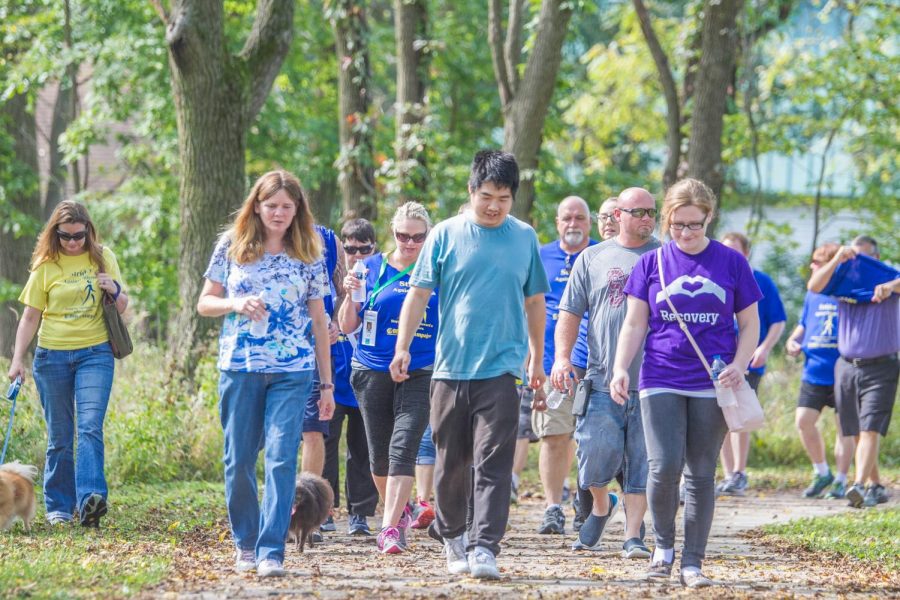Organization takes strides for mental health awareness
Participants in the NAMI walk take their first steps along the two-mile course at Meadowbrook Park on Sunday, Oct. 7. Local chapters of NAMI worked together to organize the event, which they hope to continue to hold annually.
Oct 9, 2018
Whether in honor of lost loved ones or those currently affected by mental illness, students and community members alike joined the National Alliance on Mental Illness (NAMI) at their first annual Strides Against Stigma walk on Sunday.
The walk was an effort to raise awareness and show support for mental health in the community.
The event, organized by the NAMI-UIUC, saw about 60 to 75 people participate in the walk. NAMI is a nationwide grassroots organization dedicated to raising awareness for mental illness and providing resources to those in need.
Participants in Strides Against Stigma—who received fluorescent blue T-shirts with a $25 donation—walked the perimeter of Urbana’s Meadowbrook Park, followed by a raffle and food.
Here, participants shared stories and bonded over their shared experiences.
Get The Daily Illini in your inbox!
After losing his fellow friend and co-worker to mental health issues this past June, Patrick Cosvy of Champaign’s II-VI EpiWorks, showed his support for NAMI Sunday afternoon with a small donation.
“We really do miss him,” said Cosvy. “We’re here today to support him and his family.”
Additionally, other participants walked for themselves, having faced mental health issues firsthand.
“I’ve had my struggles with mental health before and I have friends who have,” said Carson Rohder, freshman in LAS. “I just wanted to get out here, make a difference and do what I can to help others.”
Considering it is the inaugural walk, Strides Against Stigma was a great success, according to Abby Kehe, NAMI-UIUC co-president and LAS junior.
“We’re really excited about this walk,” Kehe said. “It’s all about getting the word out about mental health, coming in solidarity and supporting those who have been affected by mental illness.”
Since last semester, Kehe and her executive counterparts have been collaboratively working with their chapter sponsor Diane Zell (who serves on the NAMI-Champaign chapter) to effectively execute their first chapter-led event.
“This event is a combination (of an) awareness event and fundraiser,” Zell said. “It helps us so that we can continue to get people trained to offer support groups, education classes and so that we can serve more people.”
Zell, who formerly served as a local high school psychology teacher, has been volunteering for over 10 years and currently serves on the NAMI state board, where she dedicates much of her time to awareness and consultation practices.
“When I got ready to retire from teaching, I thought that now I may have some time that I can spend,” Zell said. “I can learn more. I can volunteer. So I signed up to take one of NAMI’s signature programs which is the Family-to-Family education class.”
From there, Zell was asked to teach one of these classes before taking the course herself since she had a strong background in mental health.
Since teaching her first class, Zell has been committed to serving the mental health community.
“The reason I got involved was that I have a loved one who lives with it,” Zell said. “It’s very difficult and you feel alone, and NAMI is very good about making you know that there is hope, you are not alone and that recovery is the expectation for people.”
On campus, NAMI provides an opportunity for students who are passionate about mental illness to get involved, promote awareness and meet others with similar interests.
“Mental health is very relevant and important to know about,” Kehe said. “Being involved in an RSO where mental health is a priority is really important to me.”
What’s unique about NAMI is that all of its offered services are free.
Students who are seeking help regarding mental illness can find it easily accessed through NAMI, whereas some resources on campus may be a bit more limited, according to Zell.
“They may find that the mental health condition is difficult to manage without help and that it is hard to get the proper help,” Zell said. “There aren’t enough counselors on campus.”
As for students, that presents a great barrier to achieving a healthy lifestyle and further reinforces the stigma that is associated with mental health conditions.
“Mental illness does not discriminate,” Zell said. “Anyone can get a mental illness, but the most common time for someone to become ill is during late adolescence and early adulthood.”
Strides Against Stigma was an emotional event for many who have lost loved ones to mental illness, but the tight-knit feel of the event brought hope and community to those in attendance. Additionally, it offered a glimpse of what is to come if groups like NAMI continue promoting awareness for the issue.
“It’s about getting rid of the stigma,” Zell said. “People shouldn’t feel that there is something wrong with them or that it’s a character flaw if they have a mental illness.”






